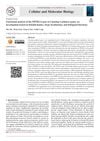
Search
for
Sort by
Research
630-660 / 1000+ results
research Optimal Stimulation Toward the Dermal Papilla Lineage Can Be Promoted by Combined Use of Osteogenic and Adipogenic Inducers
Combining specific inducers helps dermal papilla cells regain hair-forming ability.

research Human Teeth Are Useful Even After They Are Shed: Why Discard Them?
Baby teeth stem cells can potentially grow organs and treat diseases.

research MicroRNA-148a Controls Epidermal and Hair Follicle Stem/Progenitor Cells by Modulating the Activities of ROCK1 and ELF5
MicroRNA-148a is crucial for maintaining healthy skin and hair growth by affecting stem cell functions.
research Melanoma: Genetic Abnormalities, Tumor Progression, Clonal Evolution, And Tumor-Initiating Cells
Melanoma's complexity requires personalized treatments due to key genetic mutations and tumor-initiating cells.

research Tumor Promotion in Skin: Are Active Oxygen Species Involved?
Active oxygen species might be involved in skin tumor growth, but their exact role is unclear.

research Keratinocytes of the Upper Epidermis and Isthmus of Hair Follicles Express Hemoglobin mRNA and Protein
Skin cells and certain hair follicle areas produce hemoglobin, which may help protect against oxidative stress like UV damage.

research A Hairy Situation: PADIs in Regeneration and Alopecia
Enzymes called PADIs play a key role in hair growth and loss.

research Trends in the Global Organoid Technology and Industry: From Organogenesis in a Dish to the Commercialization of Organoids
Organoid technology is advancing and entering commercial use, with applications in disease modeling, drug development, and personalized medicine.
research Generation of Skin Organoids: Potential Opportunities and Challenges
Skin organoids from stem cells could better mimic real skin but face challenges.

research Functional Analysis of the PIP5K1A Gene in Liaoning Cashmere Goats: An Investigation Based on Bioinformatics, Tissue Localization, and Biological Functions
The PIP5K1A gene helps cashmere growth in goats by promoting cell proliferation, and melatonin boosts its expression.

research Green Fabrication of Seedbed-Like Flammulina Velutipes Polysaccharides-Derived Scaffolds Accelerating Full-Thickness Skin Wound Healing Accompanied by Hair Follicle Regeneration
Mushroom-based scaffolds help heal skin wounds and regrow hair.

research IL-36α Promoted Wound-Induced Hair Follicle Neogenesis via Hair Follicle Stem/Progenitor Cell Proliferation
IL-36α helps grow new hair follicles and speeds up wound healing.

research Mesenchymal Stem Cells from Adipose Tissue in Clinical Applications for Dermatological Indications and Skin Aging
Fat-derived stem cells show promise for skin repair and reducing aging signs but need more research for consistent results.

research Integrative Analysis of Methylome and Transcriptome Reveals the Regulatory Mechanisms of Hair Follicle Morphogenesis in Cashmere Goat
DNA methylation and long non-coding RNAs are key in controlling hair growth in Cashmere goats.

research Abstracts
Get head MRI for babies with achondroplasia early, use free immunoglobulin light chains to detect certain neurodevelopmental disorders, and video calls work for speech therapy in patients with facial anomalies.

research Tailored Chromatin Modulation to Promote Tissue Regeneration
Understanding and manipulating epigenetic changes can potentially lead to human organ regeneration therapies, but more research is needed to improve these methods and minimize risks.

research Alteration of Skin Properties with Autologous Dermal Fibroblasts
Using your own skin cells can help repair aging skin and promote hair growth.
research Pathology of Mouse Models of Accelerated Aging
Progeroid mouse models show signs of early aging similar to humans, helping us understand aging better.

research Eccrine Sweat Glands Associate With the Human Hair Follicle Within a Defined Compartment of Dermal White Adipose Tissue
Sweat glands and hair follicles are structurally connected within a specific layer of skin fat.

research Physiological Functions of PP2A: Lessons from Genetically Modified Mice
Mice studies show that Protein Phosphatase 2A is crucial for cell growth, development, and disease prevention.

research The Mesenchymal Niche of the Hair Follicle Induces Regeneration by Releasing Primed Progenitors from Inhibitory Effects of Quiescent Stem Cells
The study found that a specific area of the hair follicle helps start hair growth by reducing the blocking effects on certain cells and controlling growth signals.

research The Effects of 3-Hydroxy of Kaempferol on Interfollicular Epidermal Stem Cell Fate
Kaempferol helps skin stem cells grow and may improve skin thickness due to its 3-OH group.

research Myocardial NF-κB Activation Is Essential for Zebrafish Heart Regeneration
NF-κB is crucial for zebrafish heart repair, affecting heart cell growth and repair processes.

research Activation of mTORC1 Signaling Is Required for Timely Hair Follicle Regeneration from Radiation Injury
mTORC1 signaling needed for quick hair follicle recovery after radiation damage.

research Evaluation of Non-Activated and Activated PRP in Hair Loss Treatment: Role of Growth Factor and Cytokine Concentrations Obtained by Different Collection Systems
PRP treatment improves hair growth, and the device used can affect results, with some being more effective.

research Hair Growth Promoting Effect of Dermal Papilla-Like Tissues from Canine Adipose-Derived Mesenchymal Stem Cells in Athymic Nude Mice
Tissue from dog stem cells helped grow hair in mice.
research Characterization of Hairless (Hr) and FGF5 Genes Provides Insights into the Molecular Basis of Hair Loss in Cetaceans
Cetaceans lost hair due to changes in the Hr and FGF5 genes.
research Platelet-Rich Plasma in Dermatology: New Insights on the Cellular Mechanism of Skin Repair and Regeneration
PRP helps skin heal, possibly through special cells called telocytes.

research Roles of Melatonin in Goat Hair Follicle Stem Cell Proliferation and Pluripotency Through Regulating the Wnt Signaling Pathway
Melatonin helps goat hair stem cells grow and maintain their ability to become different cell types.